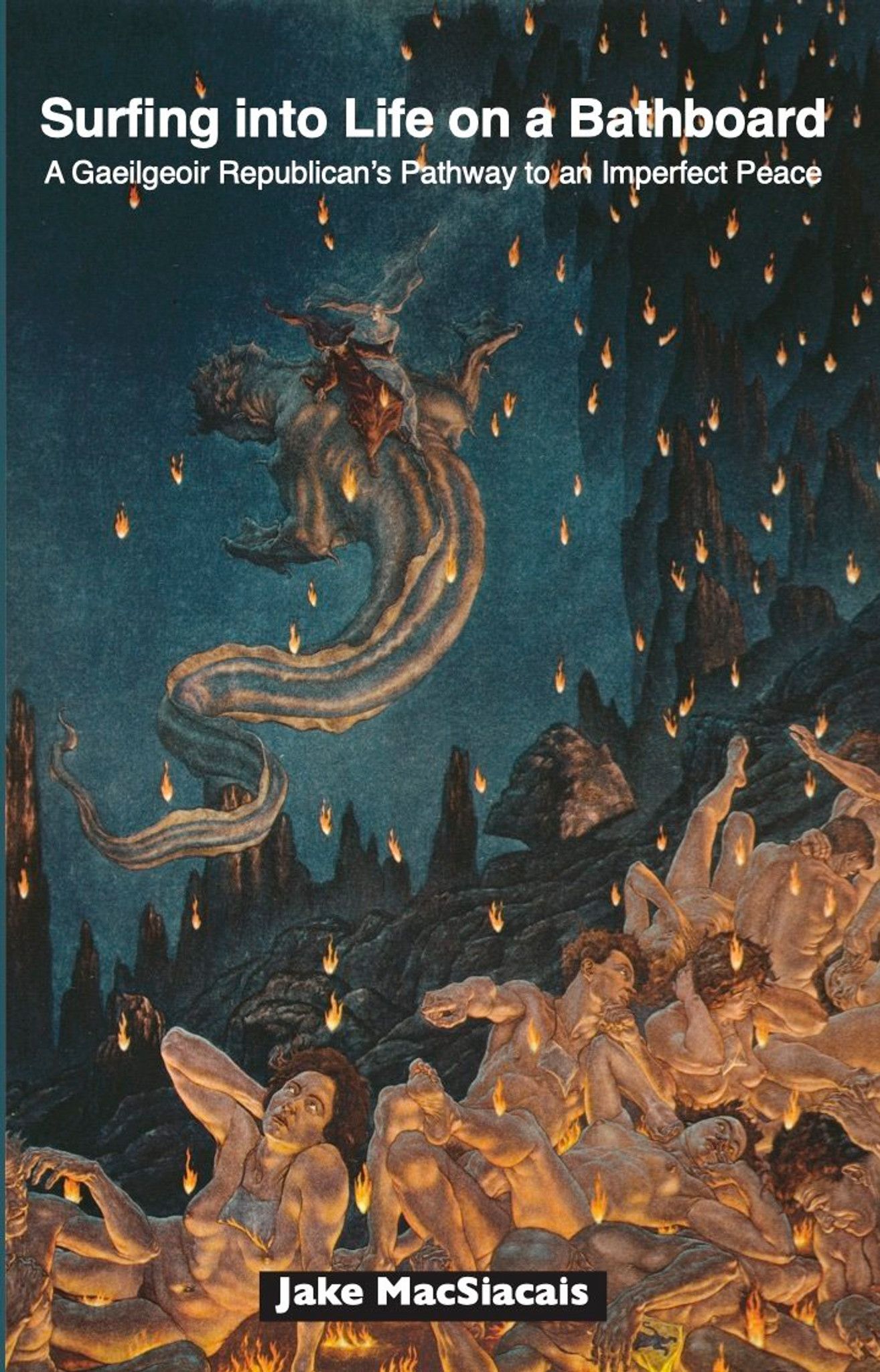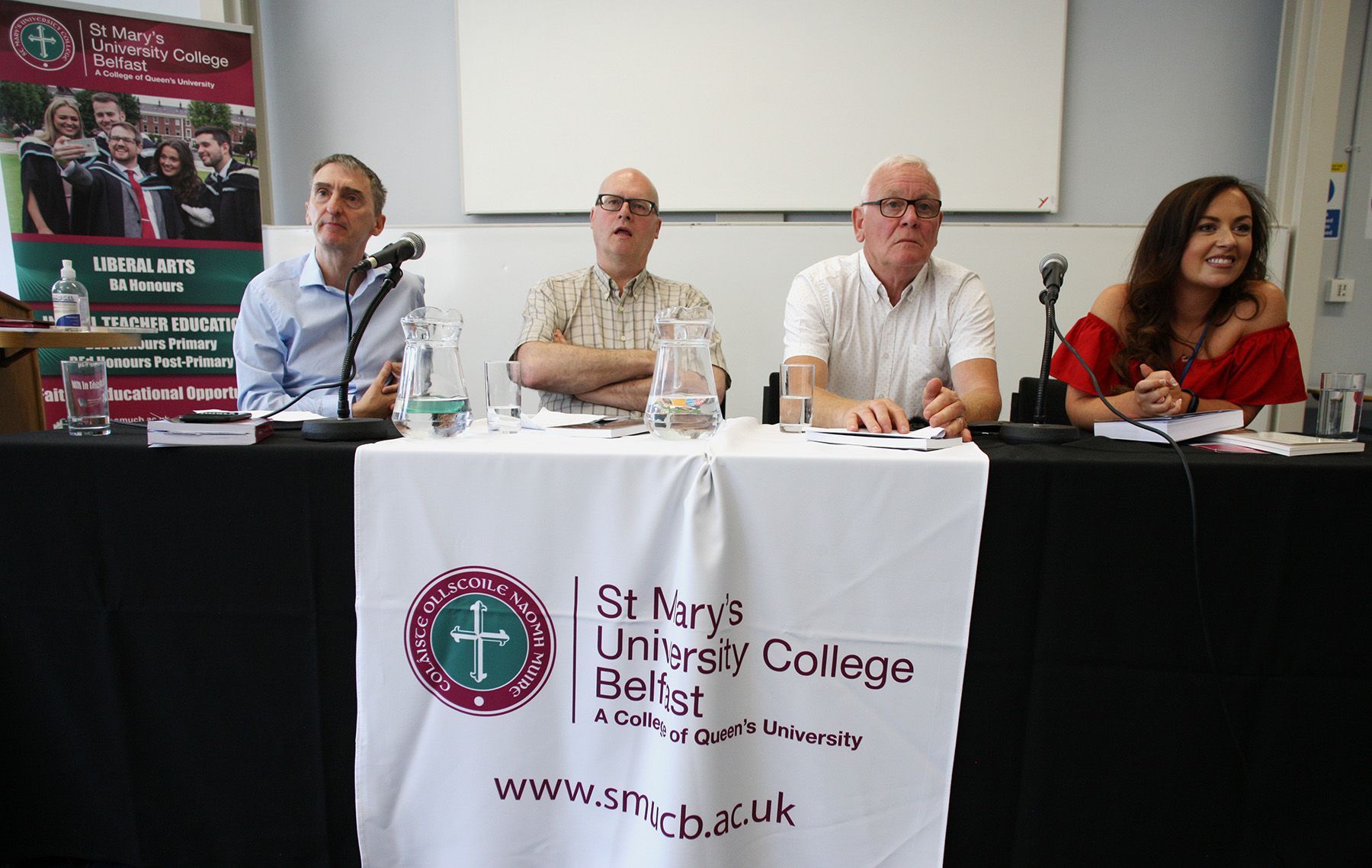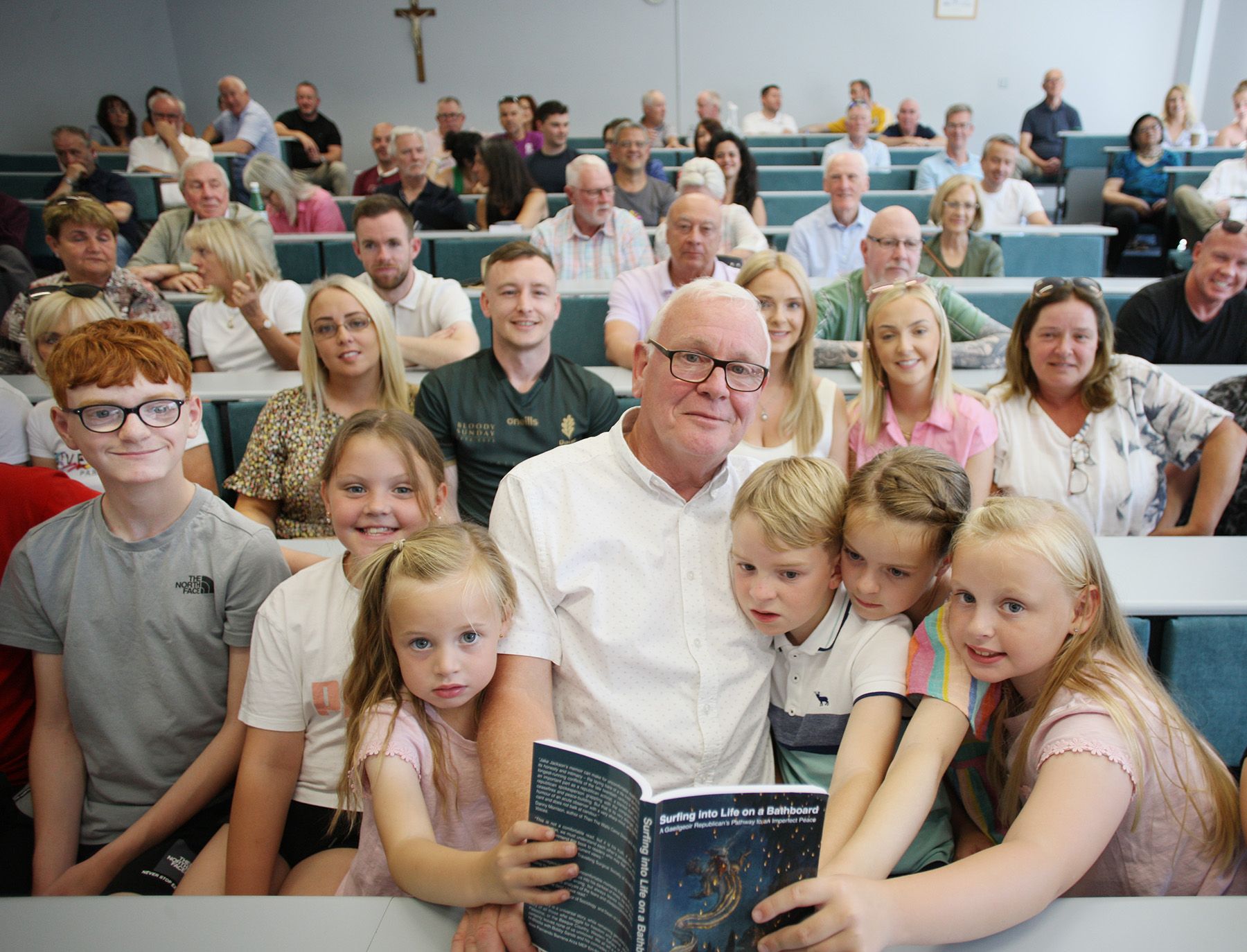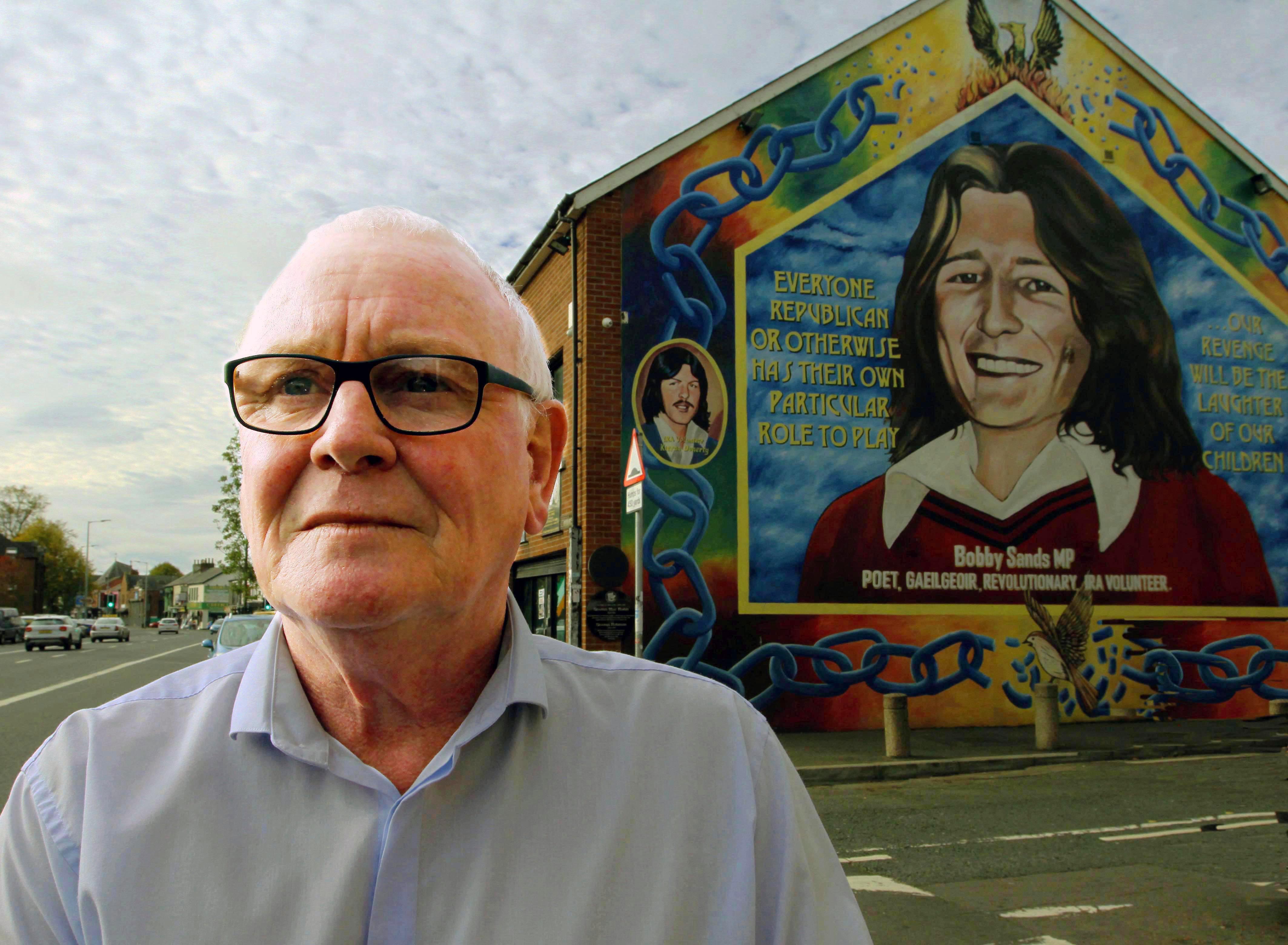THE arc of Jake Mac Siacais’s life as documented in his autobiography is like a classic Hollywood script – from idyllic childhood through decades of hell to a present day triumph.
The former prisoner devoted the best part of his life to the republican cause, but Surfing into Life on a Bathboard is more than simply Jake’s life story – it’s an account of a West Belfast community’s struggle against oppression that has yet to be fully documented.
His autobiography’s unusual title might set it apart from the raft of books written by former IRA prisoners, many to mark the 40th anniversary of the 1981 hunger strikes. But Jake’s book still sits firmly in that prison genre and his accounts of horrific years spent in the H-Blocks in run-up to that epoch-defining fast are both harrowing and inspiring.
His story – which gives the book its unique title – started on August 7 1958, when the Sisters of Mercy at the Mater Hospital told his heavily pregnant mother Rosie to bathe before she gave birth – and while she was in the bathroom her first son arrived on a bathboard straddling the bathtub.

Jake’s early childhood after the Jackson family moved into Navan Green in Andersonstown showed no sign of the turmoil that was around the corner. These estates were built on the edge of the countryside and children spent as much time in the fields and mountains as they did on the streets.
Jake, as is the custom with large families, spent a lot of time in those early years with his grandparents, which meant that he was steeped in the old country customs and traditions.
The innocence of youth was to end prematurely for Jake, as they did for so many people as a new decade approached. The dark clouds of the Troubles were gathering.
Aged just 10, Jake joined the Fianna. He was to give 30 years to the Republican Movement, finally leaving in 1997 on the cusp of the Good Friday Agreement.
By 1972 and aged just 14, he was already certain of the role he wanted to play was in the struggle, even though his father Gerry was furious when the bombs of Bloody Friday exploded, and gave off to young Jake for defending the IRA.
Jake recounts how West Belfast suddenly became what seemed like an open-air concentration camp, with the British Army taking over most of the schools. Jake’s La Salle/St Genevieve’s was occupied by soldiers, leading to continuous IRA attacks. The school kitchen was destroyed by a bomb, injuring soldiers.
“On one occasion a number of my friends managed to wrest a General Purpose Machine Gun from the hands of one of the sentries – the gun was delivered to IRA men in a waiting car to loud cheers from all the students,” Jake writes.
Lunchtime saw riots at the school gates – and Jake makes the salient point that the challenges faced by educators under British occupation deserve proper recognition. “West Belfast was a veritable armed camp,” he writes.
During all my interrogations, I adopted a strategy of giving all my attention to entering my mother’s home. I would walk through the front door, noting every detail. Every time my interrogators would break my train of thought, I would return to the front door and begin my journey again. Rosie’s front door always stood between me and any threat from outside.”
The idyllic childhood playing in the countryside seemed like a world away. Death and violence were commonplace – and throughout the book it’s tragic how many people the author knew who lost their lives. People grew up early in those tumultuous times, and by 17 Jake was facing his first spell in prison.
He recounts how he was arrested and taken to Springfield Road RUC barracks where he faced three arduous bouts of interrogation. He was dangled by his ankles out the second-floor window and was waterboarded by RUC officers. But he never uttered a word.
He didn’t know it at the time, but he was exercising a classic anti-interrogation technique of concentrating on something else entirely, so that the interrogation itself is like an out-of-body experience. He writes: “During all my interrogations, I adopted a strategy of giving all my attention to entering my mother’s home. I would walk through the front door, noting every detail. Every time my interrogators would break my train of thought, I would return to the front door and begin my journey again. Rosie’s front door always stood between me and any threat from outside.”
Sent to Crumlin Road prison in 1975, he details the daily degradations – as well as the many moments of levity. With a personality already shaped by an insatiable appetite for reading books which had been instilled by his father, he was always ready to question accepted norms.
During the first of the eight Christmases he was to spend in jail, he was to learn that republican prisoners fasted on Christmas Day and St Stephen’s Day “to demonstrate that they have discipline and self-sacrifice”. Jake spoke his mind to authority about what he thought of the “mad” order, which was eventually scrapped.
During his first night in the Crum he started to read the Bible because there was no other reading material in his cell. By the time he left jail in 1982, he managed to read the Bible from cover to cover, in English and Irish, five times – but still managed to leave prison an agnostic!
Jake, second right, with the book's reviewer Gearóid Ó Muilleoir, left, during the book's launch at Féile. Joining them were publisher Robbie McVeigh and Brónagh Fusco from the Cultúrlann
Then in 1977, just seven weeks after his release, he was arrested in Turf Lodge and charged with attempting to kill a soldier. He said nothing, but was eventually convicted and ended up in the H-Blocks.
While he was on remand in the Crum, he went over the events leading up to his arrest in his head, night after night. He suddenly came to a realisation that there was only one possible explanation: the British soldiers must have had a concealed spy-post in the Turf Lodge flats! He put the word out and the IRA uncovered a hidden observation post with two soldiers, who had been allowed to enter by an informer through a trapdoor in his bedroom ceiling.
By the time Jake arrived in the H-Blocks in October 1977, he was a fluent Irish speaker and was “already a veteran of imprisonment. Looking back now, I was a mere youth,” he writes.
Aged just 19, he was among the more senior prisoners as far as age and experience went.
The brutality of the H-Blocks has been well documented, but it’s no less horrific for each new telling. At one stage Jake relives how staff threw boiling water over him in his cell, scalding him badly. A loyalist in the next cell offered him support.
In the book, he recounts years later meeting a fellow blanketman in the Cultúrlann. “I hadn’t seen Tommy since 1980. Tommy spent time on the hunger strike.
“We met with a very warm embrace, as is customary with those who shared the trauma of the Blanket protest. As Tommy said, there is a depth of connection from the shared experience which will forever be.
“Tommy, born and raised in Moyard, told me how his journey to the H-Blocks began when his mother ended his childhood idyll of football and fun with the news that her brother had been shot and wounded during disturbances in Hooker Street in Ardoyne and it was time to flee their home.
“Tommy became a loyalist combatant. I was delighted to see Tommy again and certainly won’t wait as long to see him again.”
When the naked Jake had been scalded in his cell, it was Tommy in the next cell who passed on words of comfort.
Bobby came to the door and said a few words and then sang Back Home in Derry. It was a heartbreaking moment and the poignancy of the occasion swamped us.”
Humour is at the core of Jake’s personality, and his life story is littered with funny anecdotes. He recounts how prisoners used the pages from the Bible to make roll-ups. On one occasion the priest remarked to the first ever blanketman, Kieran Nugent, that he was glad to see him reading his Bible. Kieran replied: “I haven’t read a word of it, but I’ve smoked Genesis, Exodus and Leviticus and will soon make a start on Numbers and Deuteronomy!”
‘Baby-faced’ Jake was to be in the cell next to Bobby Sands, and historians in the future will pore over Jake’s first-hand account of the hunger strikes.
One particularly poignant event was when Bobby turned 27 on the ninth day of his hunger strike. Since turning 18, Bobby had spent every birthday in prison.
The prisoners decided to hold a concert in his honour – “I can still feel the emotion of that night, even though 40 years have passed,” Jake writes.
“This would be our last chance to spend quality time with our comrade, as we knew he would be removed soon to the prison hospital where he would die.
“Bobby came to the door and said a few words and then sang Back Home in Derry. It was a heartbreaking moment and the poignancy of the occasion swamped us.”
He adds: “We didn’t have our sorrows to seek as ten comrades went to their deaths. Their sacrifice smashed Britain’s criminalisation policy, reinvigorated the republican struggle, internationalised the struggle, radicalised nationalism and paved the way for the endgame in Ireland.”
Jake was released in April 1982, but it was a bittersweet experience. “I was leaving behind ten of the bravest men it had ever been my privilege to have known,” he writes.
He threw himself back into his work with the Republican Movement, but also with the West Belfast community. And it was during these years that he first visited the Basque Country and built friendships and alliances there that he still treasures today.
Jake had a central role in the Republican Movement during those crunch years when the conflict intensified post-hunger strikes.
And when the first moves towards peace emerged, he was also centre stage. He recounts crunch meetings including one in Carrigart in Donegal in 1987, and then in Letterkenny, as the IRA edged ever closer to ceasefire. During this time, he also honed his skills in journalism as northern editor of An Phoblacht.
The looming ceasefire was a fork in the road for Jake. He writes: “I was convinced we had entered a new era. I was very much in favour of a ceasefire. Armed struggle had run its course. Republicans had developed the struggle to the point where we could devise a comprehensive non-armed strategy to attain our objectives.
“I knew that four senior figures were already planning to leave and form another military organisation if they failed in their attempts to change the direction of the leadership. I agreed largely with their assessment of where we were at, but vehemently opposed their conclusion.”
On October 16 1997, he left the Republican Movement. “I was totally comfortable and convinced that I was doing the right thing,” he writes.
It was the end of one vocation, but the beginning of another. By the end of the month he had his first job in the community – the West Belfast Traders’ Association – the first of many, including as Deputy Editor of the Andersonstown News and editing Lá, before moving to Forbairt Feirste, which was developing the new Gaeltacht Quarter.
He also started a family after marrying Chrissie Keenan in 1985, whose father Brian was serving 16 years in Leicester Prison at the time. Jake wasn’t allowed to visit his soon-to-be-father-in-law as he was refused permission to enter Britain. They were to have five children together, and they’re the pride of his life.
Jake with his wife Chrissie, children and grandchildren at the Féile book launch
But the years of struggle had left their scars. In 2016 he suffered a breakdown caused by post-traumatic stress disorder, and writing these memoirs – first in Irish as Ón Taobh Istigh – was part of the healing process. “I had to reach the depths so that I could reach for the heights,” he writes.
The cover of book reflects his struggles – a painting by Amos Nattini showing Dante and Virgil leaving the seventh circle of hell.
Ultimately, Jake remains optimistic about the future: “Unionism is without vision and we must all hope against hope that a pragmatic leadership will eventually emerge,” he writes.
He ends with a tribute to the Irish language visionaries of his native city: “I was 10 years old when Belfast’s Irish pioneers began the Gaelic revolution in the city. We haven’t seen the end of that revolution yet.
“Remember we are Gaels – we don’t sleep, we just rest from time to time."
Surfing Into Life on a Bathboard by Jake Mac Siacais is published by Beyond the Pale Books and priced £15.





